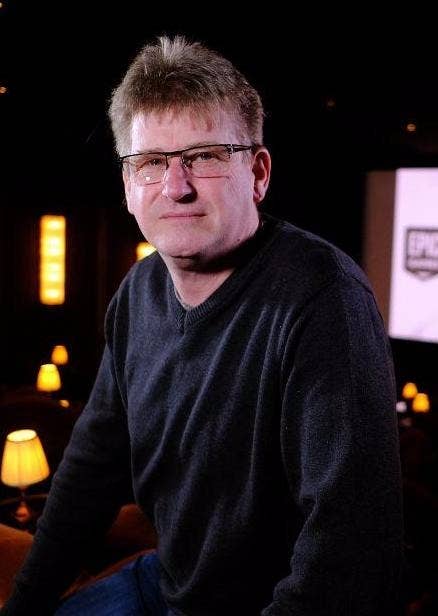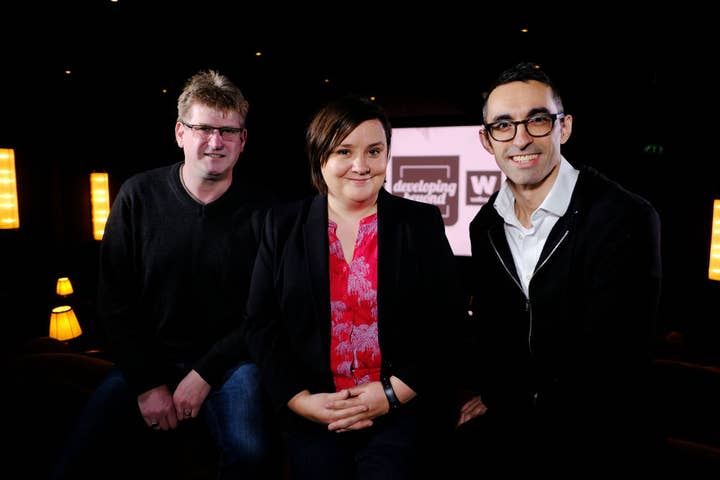How to secure a place in Epic and Wellcome's $500,000 development competition
Epic's Mike Gamble reveals what the judges are looking for, how a scientific basis can build a triple-A IP and the role of comedian Susan Calman
Earlier today, Unreal Engine creator Epic Games announced a partnership with charity Wellcome Trust that challenges developers to create the foundations of a new game within a year. The funding for finalists and the prize money amounts to a whopping $500,000.
But what exactly are the two companies looking for with Developing Beyond? Naturally, projects are expected to be developed in Unreal Engine 4, but they are also only required to be for PC at this stage. Mike Gamble, EU Territory Manager for Epic Games, explains why.
"The idea of the competition is to create a minimum viable product, not a finished game," he tells GamesIndustry.biz. "Using PC as the base platform allows for porting to any other format after the competition. After all, the products will hopefully be developed into full games."

That seems fairly unusual for this type of competition. While game jams often focus on prototypes, longer competitions spanning several months usually require studios to build their games to an almost-finished standard of quality. With a year to play with, it's easy to assume Epic and Wellcome would be expecting more.
"What we wanted to do was encourage the creation of new IP and the development of titles that are sustainable and could be turned into a triple-A brand, if that's the way the project was going," Gamble explains. "A year out of a three-year cycle for a triple-A title is not very much. We're trying to set the quality bar high because there are lots of game jams, lots of competitions and we wanted to set ourselves apart from that kind of mentality.
"Realistically, if you want a team to develop an MVP that really has a chance to become a fun and good-selling game, a year is really what you need. To try and squeeze that into a shorter period of time adds an extra level of challenge that is not realistic from a development perspective. A year is generous to create an MVP.
"We're trying to set the quality bar high because there's lots of game jams, lots of competitions and we wanted to set ourselves apart from that kind of mentality"
"We're talking about small teams here - even if they're within a large studio, they're going to be a small team. So it seemed like a good period of time that would allow good quality products to be built, and has a nice sort of symmetry to it from a competition point of view."
The theme for the competition is something that may catch hastier studios out a little. While the actual given term is 'Transformations', the organisers stress that this needs to be in context of "exploring the human condition" - not, as one might assume, giant robots (or other tropes) that combine to form more powerful robots.
The seemingly serious subject matter is partly down to the contributions of Wellcome, a biomedical charity that helps promote the use of real science within entertainment. The organisation has worked with Epic on previous competitions, and the engine maker was keen to see entrants deliver something that plays to Wellcome's strengths.
"Having them as a bedrock for the subject matter allows us to really deliver some content that is interesting beyond what is perceived to be pure entertainment," says Gamble.
"Whatever happens, these games will not be edutainment, gamification or any of those horrible words. They will be great entertainment products with an interesting scientific basis"
"The great thing about the subject matter, Transformations, is that it is so very wide. It can be anything from cellular transformation to the transformation of a virus, but equally it can be the transformation of society, civilisation - even terra-forming. As long as it conforms to the scientific basis for that stuff then it's a valid subject."
To further emphasise this, finalists for Developing Beyond will have a scientist join or at least work closely with the team. While this might sound odd, Gamble observes it's not unknown - and doesn't just mean a person in a white labcoat will be hanging around the studio.
"When we say 'scientist', perhaps that conjures up slightly the wrong image," he says. "The guys at Wellcome have already assigned experts to work with Ninja Theory on Hellblade, to advise on the psychological aspects. This would be a similar relationship: somebody whose area of expertise is the same as the area the game itself is targeting. They can advise on the reality of the subject matter and how it can be woven into the game in a way that is scientifically accurate but still entertaining.
"Whatever happens, these games will not be edutainment, gamification or any of those horrible words. They are genuinely meant to be great entertainment products with an interesting scientific basis."

So what are the judges looking for? There are only six slots available, an incredibly broad theme and the potential to create new triple-A franchises. Gamble urges developers to think very carefully before they pitch. While the deadline is February 10th, it's worth taking the time to really consider what they can accomplish with this.
"Susan Calman brings a real gamer's view rather than a games industry view - and I think that's very important"
"Think a little more deeply, spend some time researching what the game's subject matter could be," he says. "We're looking for pitches that are entertaining, that will make great games, and that are realistic to develop within a year. We're looking for teams that can show they're capable of delivering an MVP within that time."
The finalists will be chosen by a judging panel headed up by Susan Calman, comedian and broadcaster. To some, it might seem like Calman is merely bringing celebrity association to an industry competition but her role is much more important.
"Obviously, she helps raise awareness of the competition, which is no bad thing," Gamble acknowledges. "She is a very keen gamer so in addition to her celebrity status, she brings a real gamer's view rather than a games industry one - and I think that's very important. We can go down the rabbit hole a little bit and pursue the things that we all love as insiders, so to have a good perspective on that from outside is really important."
The panel will still have industry insiders on board, including development legend John Romero, but Gamble says Epic, Wellcome and Calman have worked hard to ensure a balanced panel.
"We've got almost a 50-50 split," he says. "We've got industry judges like John who bring a wealth of experience and knowledge. But then on the flipside we've got judges from the non-gaming side, but experts in some interesting subject matters. I can't give away too much but when the full jury is revealed, you'll see there are some people who can offer a very different angle to how we look at these games."
Developers can find out more about the competition at www.developingbeyond.com.
